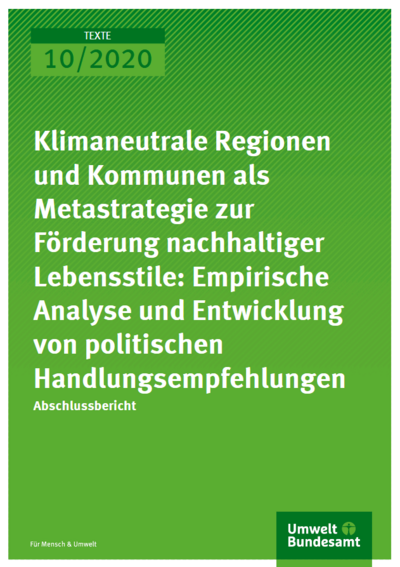Climate-neutral regions as a strategic approach to promote sustainable consumption patterns Empirical analysis and development of policy recommendations (Final report)
This report has been produced within the scope of the project funded by the German Environment Agency entitled “Climate-neutral regions as a strategy to promote sustainable consumption patterns – analysis and development of policy recommendations”. The project analyses to what extent regional climate protection concepts could be used as a metastrategy for the diffusion of sustainable lifestyles and sustainable consumption. For this purpose, firstly climate protection concepts which pursue the aim of climate neutrality have been analyzed in regard to aspects of sustainable consumption and, secondly, quantitative and qualitative surveys have been conducted with contact persons in the municipalities.
Climate protection managers generally attach a high strategic importance to the involvement of citizens; consumption-based measures can serve as a door-opener for raising private households’ awareness of climate protection. On the other hand, a lower importance is ascribed to the promotion of sustainable consumption; in this case, it is clear that climate protection managers do not see the subject of sustainable consumption as part of their remit. Prioritized fields of need tend to be more in the areas of "Energy" and "Mobility", although consumption-based measures in the areas of “Food" and “Work” are gaining in importance. In general, measures covering different areas of need and measures which are accompanied by, for example, a high expected effect and/ or cost efficiency are preferred. The greenhouse gas statement also plays a key role when it comes to the selection of measures, since legitimization and monitoring are easier in this case. Consumption-based measures are, however, often given less consideration in climate protection concepts due to the lack of data availability. Based on the project findings, central strategies and recommendations are derived at various levels, namely at the level of national environmental policy, at municipal level and at the level of effectiveness of climate protection managers.
Download of the report (German, PDF, 3,1 MB)



